Best WordPress Hosting of 2025
Best WordPress hosting providers recommended by trusted experts
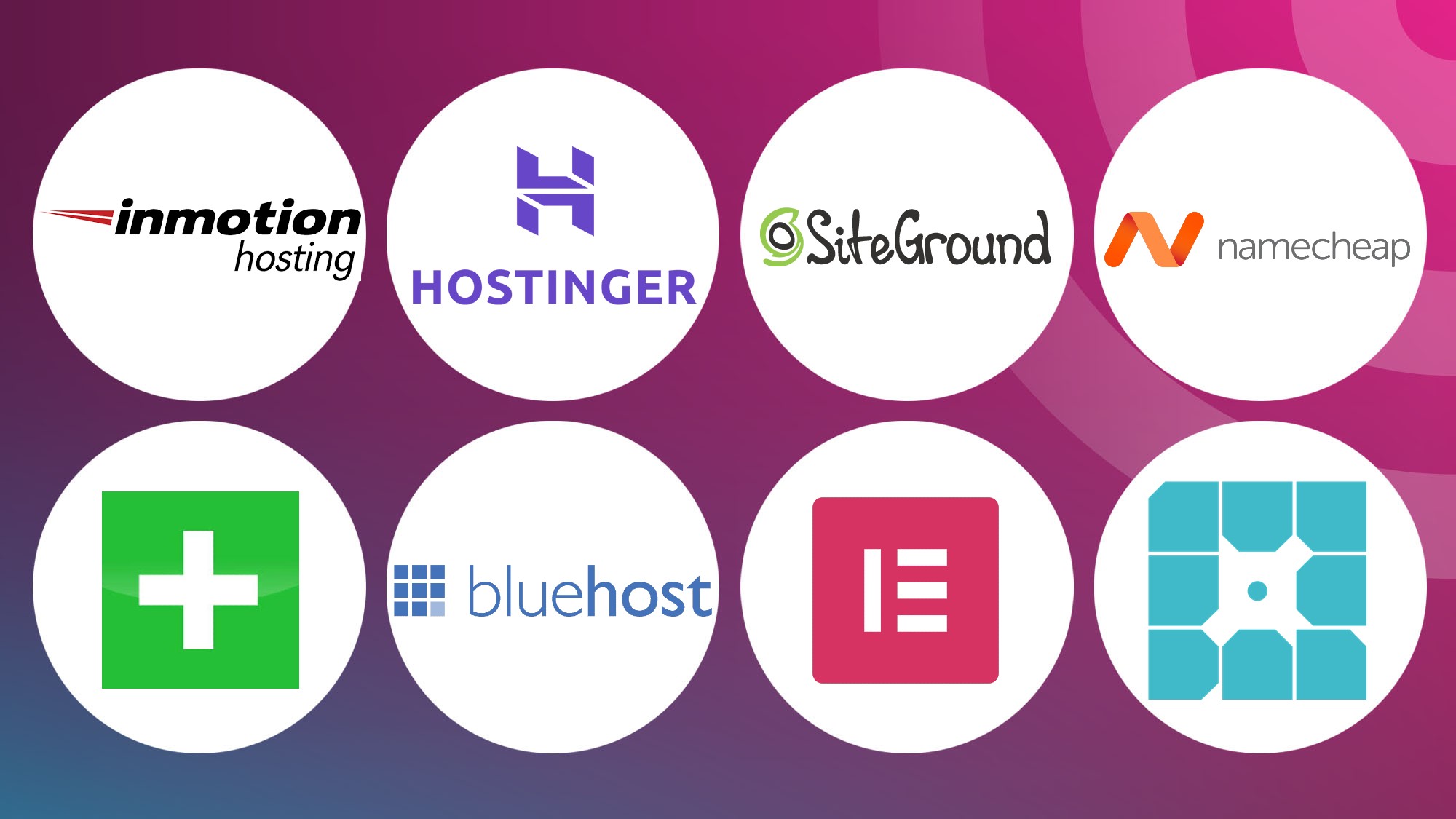
The best WordPress hosting gives you just the right amount of freedom to create your site without letting you get yourself into trouble and provides the support available for if you do. The majority of the best web hosting providers already have WordPress preinstalled and WordPress itself is relatively easy to use but the best WordPress hosting providers make hosting and managing a WordPress easier.
If WordPress is not preinstalled it's available to download for free at WordPress.org but you need to host the websites you create to make them accessible on the Internet.
If you want to learn more about WordPress hosting, you can check out our What is WordPress hosting? guide and if you want to hear from the top WordPress hosting providers themselves, check out What makes a web host good for WordPress.
Top three best WordPress hosting providers
These are our top three recommendations for WordPress hosting based on our user experience.
Bluehost
The best WordPress hosting overall
I'm recommending Bluehost as best overall for WordPress because of the performance, ease of use, Bluehost WordPress academy, and its continued support in the WordPress community as one of the hosts recommended by WordPress for the longest time.
Learn more below ▼
Hostinger
The best WordPress hosting for beginners
Hostinger are one of the newer hosts in the WordPress space and recently became the latest edition to the recommendations by WordPress. Hostinger are best for beginners because of the straight forward onboarding process and AI website builder for WordPress.
Learn more below ▼
SiteGround
The best WordPress hosting for mature sites
You've built a site, it's got some traction, and renewal is coming up. To take it to the next level, get more power, and a wider reach, SiteGround are one of the best options.
The plan is more expensive than the other two options but when you consider that you get daily backups and a CDN it's more on par when it comes to value.
Learn more below ▼
Top three head to head
| Row 0 - Cell 0 | Bluehost | Hostinger | SiteGround |
Price (after renewal) | $13.99 | $12.95 | $17.99 |
Websites | 50 | 100 | 1 |
Storage | 50 GB NVMe | 100 GB SSD | 10 GB |
Managed | Yes | Yes | Yes |
Free domain (one year) | Yes | Yes | Yes |
Yes | Yes | Yes | |
Backups | Daily (first year only) | Weekly | Daily |
CDN | Yes | No | Yes |
AI creation tools | Yes | Yes | No |
Quick summary
Why you can trust TechRadar
On balance Hostinger and Bluehost are pretty equal. The price is similar and both have one clear limitation. For Bluehost, that's back ups as they're only free for one year. They're quite important so that's something you're going to want to spend some money on after the free period ends. For Hostinger it's the lack of a CDN. This may or may not be a big deal depending on how wide of a reach you want your site to have and whether fast global speeds are essential for your business. Both of these additional features will take the price closer to the SiteGround plan, if not more.
SiteGround appear to be relatively over priced considering the amount of sites you get and the amount of storage but don't let that put you off. For established sites getting a considerable amount of traffic, compared with the Hostinger and Bluehost plans in the table you'll be getting much better performance and that's what counts.
Best WordPress hosting overall

Reasons to buy
Reasons to avoid
Bluehost is one of the world’s largest hosting providers, and with plenty of features specifically for WordPress – as well as dedicated plans for various WordPress use cases – it’s our number one choice for anyone looking for a WordPress hosting service that also needs a helping hand learning how to use the WordPress website builder. Plus, Bluehost is recommended by WordPress itself; the two have worked together since 2005 to create an ideal platform for launching and managing WordPress sites.
It’s worth mentioning that Bluehost’s WordPress plans are the same as their standard hosting plans, but because the company offers excellent WordPress support on even its shared hosting plans (such is its dedication to WP), these plans are more than capable of giving premium WordPress hosts a serious run for their money.
Plans and features
The ‘Basic’ plan is priced at just $2.95 a month (renews at $11.99 a month) and comes with support for 10 websites (most providers offer just one site on their basic plans), 10 GB of SSD storage, free CDN, free SSL, free access to Yoast SEO (so you can boost site traffic and SEO), and free domain for the first year. What’s more, Bluehost also automatically installs the latest and most secure version of WordPress. However, you’ll have to choose a higher-tier plan if you want daily website backups and malware scanning.
One of Bluehost’s most striking features is its AI website builder that’s based on WordPress. As the best website builder for WordPress sites, it will help you create and populate a site from scratch, including recommending website templates. You can choose the design you want by simply entering a keyword, and its user-friendly onboarding wizard will make the entire site-building process a breeze. It’ll also simplify customizing your website.
- AI Website creation tool: this tool works on top of WordPress unlike other AI website creation tools so you can migrate the site whenever you want. It truly belongs to you
- Cloudflare CDN : this network makes your site load faster no matter where your customers are around the world
- One-click restore: In the event of a disaster, get you site back online with one click
- Free domain for one year: Simple and easy domain setup that's free for one year
Customer support is another area Bluehost knocks it out of the park. Its team of experts is available 24/7 and you’re offered both phone and chat support. Next, while Bluehost offers an excellent 99.98% uptime guarantee on its native (and more affordable) WordPress plans, its cloud infrastructure, which is made specifically for managed WordPress websites, offers a stunning 100% network uptime guarantee, making it, quite simply, the best choice for business-critical websites.
Bluehost’s cloud hosting plans are made for high-performance WordPress websites. These plans can support up to 50 websites and provide you with 225 GB of SSD storage and a massive 150 vCPU. Lastly, Bluehost offers a 30-day money-back guarantee on all its hosting plans, meaning you don’t have to dive head first – you can try the best WordPress hosting service without risking a single penny.
The same tests that were performed on SiteGround and Hostinger were performed on Bluehost. We checked website performance on our test WordPress page through GTmetrix which gave us an LCP score which some say is closely linked to how well your site performs in Google searches.
Bluehost's LCP was only 0.603 seconds, earning it second place in our last 15 tests, and noticeably ahead of budget providers including Domain.com (1.5 seconds) and iPage (1.6 seconds).
Testing
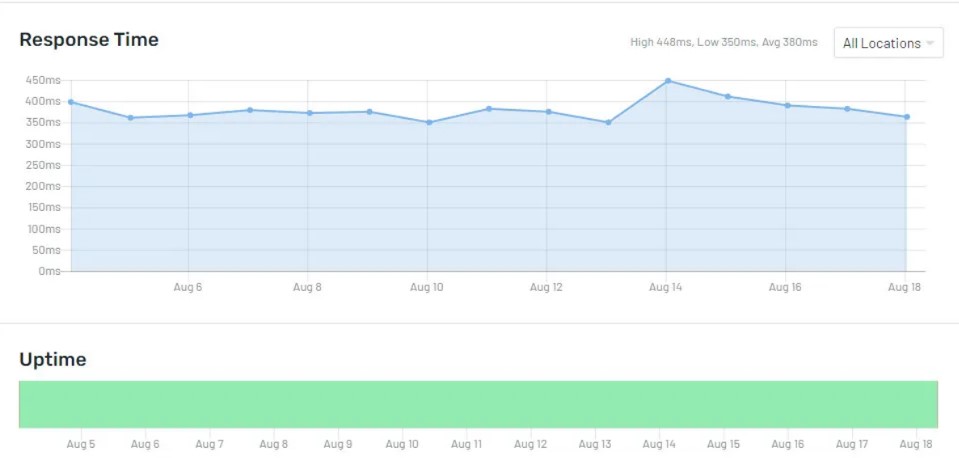
Bluehost received a score of 100% for uptime. Which is to be expected but doesn't always happen. Only four of the last 15 providers we tested managed to achieve the same high score.
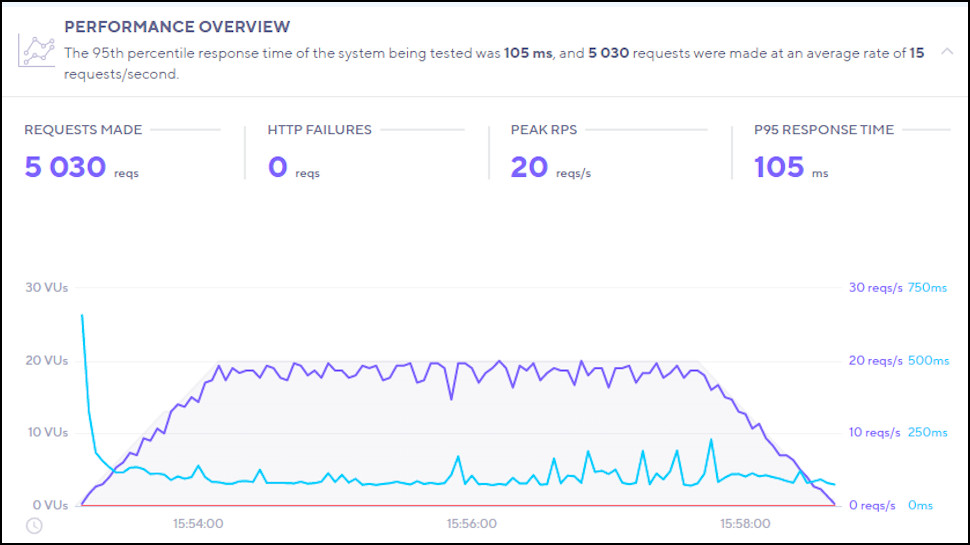
Bluehost also performed well with our stress test and managed to handle an average of 15 requests per second. In line with the scores we saw with Hostinger and SiteGround. The LPC score for Bluehost was 0.603 seconds which is the second best score we've seen in our tests.
My thoughts
Bluehost do get a bad rep in some user reviews but we shouldn't overlook their commitment to WordPress and their WordPress academy. For complete beginners their support, knowledge base, and AI website builder tools are brilliant. More experienced website hosting users might get frustrated by pricing of things like SSL and renewal costs but that's par for the course of a lot of providers.
Read our full Bluehost review
Check out our Bluehost promo codes.
Best WordPress hosting for beginners

Reasons to buy
Reasons to avoid
Hostinger have risen from competitors to become the fastest growing web host. Hostinger are making headway in the WordPress space and many WordPress users have migrated to them from other hosts recently. They have also recently been recommended by WordPress themselves for their contributions to the WordPress community. Over the year Hostinger have been relentlessly creating AI tools to help you with creating WordPress sites and have a range of other tools and features to set them apart from other hosts.
Plans and features
Hostinger's starter-level ‘Premium’ plan is priced at just $2.99 a month (plus two months free) and comes with 100 GB of SSD storage, support for 25K monthly visits, free automatic website migration, free domain, and weekly backups.
Plus, given that this plan allows hosting a whopping 100 websites, Hostinger can also be a good option for people that manage a large amount of WordPress sites on a smaller budget. However, the ‘Premium’ plan misses out on free CDN, for which you’ll have to upgrade to the next plan, which also unlocks the WordPress staging tool and daily and on-demand backups.
Next, if you need priority support (rest of the plans have 24/7 live chat, email, and ticket) and/or a dedicated IP address for increased security, consider the highest-end ‘Cloud Startup' plan. This plan also allows you to host up to 300 websites and supports 200,000 visits monthly – that’s serious value for just $9.99 per month.
Regardless of the plan you choose, there’s no shortage of WordPress-focused features. From free 1-click WordPress installation and automatic updates to pre-built templates and LiteSpeed cache for improved loading times, there’s a lot on offer. The service doesn’t disappoint on the security front, either. You get DDoS protection, a web application firewall (WAF), a malware scanner, and Cloudflare-protected Nameservers, as well as a WordPress compatibility checker that will prevent your sites from slowing down or crashing.
- AI optimization tools: this tool monitors your site logs and configuration to identify things that can be slowing your site down and provides suggestions.
- Weekly backups: with the lower-end plans you get weekly back ups, with higher end plans they become daily
- Automatic WordPress updates: Hostinger will keep your site updated for you
- Free domain for one year: Simple and easy domain setup that's free for one year
However, Hostinger is slightly underpowered when it comes to servicing very demanding websites that attract hundreds of thousands of visitors a month. If that’s you, consider opting for a Hostinger virtual private server (VPS). These come with fast NVMe storage and AMD EPYC processors for top-notch performance, as well as the ability to scale to a higher-tier plan with just a few clicks. At the same time, keep in mind that these won’t be managed plans, so you do need to be more tech-savvy.
Also, Hostinger WP hosting costs shoot up by more than 2x after the initial discounted subscription, so keep that in mind. However, for its price and feature set, it’s hard to argue with Hostinger’s appeal to beginners and SMBs. Plus, all its plans come with a generous 30-day money-back guarantee, meaning you can try it on for size risk-free.
What SiteGround are offering and what Hostinger are offering are almost the same. The difference is that SiteGround offer a lot of features across all their plans that you only get with Hostinger's higher level plans. Such as a CDN, a staging tool, and daily backups. For this reason Hostinger can offer better value for money if you don't need some of these things and can get by on a lower level plan. That's not to say there is nothing unique about Hostinger, their AI tools for optimization and debugging can save a lot of time and energy and are not a feature the other top hosts in this list provide.
Testing
We did the same tests with Hostinger that we did with SiteGround. We set up a test WordPress site on a low spec plan at a similar price point to SiteGround and then subjected it to various tests which told us how reliable the hosting is, how fast it is, and how much traffic it can handle.
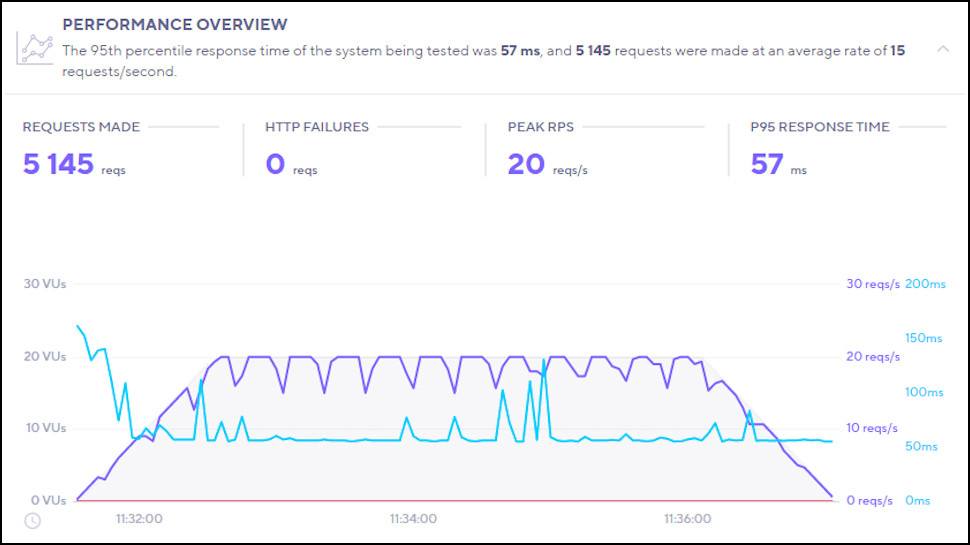
Our results from uptime.com showed that we had 100% uptime during our tests and that the response time was just a bit slower than average at 382ms. We did a little further testing with Website Speed Test and Hostinger ranked among the top 25% of providers. So, overall there are no concerns around response times and page loading times.
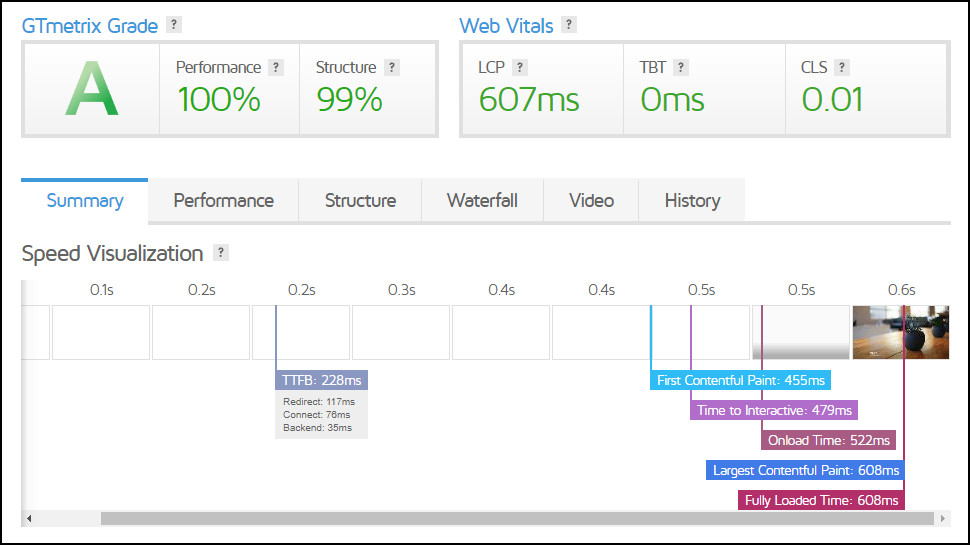
When investigating how many people can reasonably visit the shared hosting plan, our results revealed that Hostinger can sustain 15 requests per second which is just above the average of thirteen to fourteen.
My thoughts
You have to be a little careful when looking at what's available. For example, about two thirds down their managed WordPress page there is a green tick next to staging tool. It can easily seem like this is included in all managed hosting plans but it's not. After you read though the site pay special attention to make sure what you want is included in the plan.
Read our full Hostinger review
You could save on Hostinger products with our Hostinger promo codes.

Best WordPress hosting for mature sites
Reasons to buy
Reasons to avoid
SiteGround is celebrating their 20th birthday this year, making them about the same age as WordPress. Over the years, SiteGround has contributed a lot to the WordPress project including code, organising events, and supporting external contributors with the aim to make WordPress better for everyone. They've helped make WordPress more secure and more accessible. In 2016 SiteGround was recommended by WordPress themselves as one of the best hosts for WordPress alongside Bluehost and DreamHost. Since then, WordPress.com and Hostinger have joined the list and Siteground has lost position. However, many in the WordPress community still believe that Siteground remains one of the best hosting providers for WordPress and that’s reflected in the reviews and comments you see online. WordPress says being recommended by them is arbitrary (so why bother?) but then list some metrics by which hosts improve their chances of being listed. Not a good system for recommendation if you ask me.
The reason we’ve picked SiteGround as our top recommendation for WordPress rather than Bluehost or Hostinger is because of SiteGround’s customer satisfaction rating, commitment to the environment, and for contributing to the WordPress community for so long. If you’re a beginner and looking for a bit of an extra helping hand for website building, then we would suggest Bluehost because of their WordPress academy but from a hosting perspective, SiteGround is the best. For more budget friendly Hostinger, go with Hostinger.
Plans & features
SiteGround offers a lot of power and WordPress functionalities right from its most basic plan, which costs $2.99 a month (renews at a whopping $17.99 per month) and comes with free WordPress migration with SiteGround’s WP Migrator, the WP Starter site-building wizard, automatic updates of the core software and WP plugins with the latest security patches, and expert 24/7 customer support via phone, live chat, email tickets, and a web knowledge base.
The ‘GrowBig’ plan can arguably offer the best value for your money. It costs $4.99 a month (renews at $29.99 a month) and gives you the ability to host unlimited WordPress websites, accommodate up to 100,000 visits monthly, 20 GB web space, on-demand backup copies, 30% faster page-loading speeds, and a staging environment for your WordPress sites. Usually, larger plans just give you more resources which you might not need but in this case it does seem like it’s worth going for a more expensive plan. We don’t see unlimited websites as being a selling point. You only get 20 GB of space and resources are limited. Theoretically you could host an unlimited amount of websites with this plan but they wouldn’t function very well and you’ll be paying extra for more storage space so don’t look at unlimited websites as an advantage.
The highest-end plan adds free private DNS, priority support, and the ability to offer white-label hosting to your clients, meaning it’s a great option if you have a hosting business. It’s also worth noting that all three plans are managed offerings, and they all come with free SSL, daily backups, free emails, free CDN, and excellent security features such as a custom firewall, an AI anti-bot system, proactive site monitoring to keep malicious codes and hack attempts at bay, and more. There’s also a 30-day money-back guarantee for you to be able to try out the service without any risk.
- Staging tool: use SiteGround's staging tool to make a copy of your site and work on it before pushing changes live
- Collaboration tools: add developers to specific sites and deliver sites to clients when ready
- Managed security and updates: get WordPress security patched automatically
- Daily and on demand backups: SiteGround keep up to 30 copies of your site and you can create a backup at any time at the click of a button
Like GreenGeeks, SiteGround, too, is focused on improving the environment. Its data centers are part of the green Google Cloud infrastructure and match 100% of the energy they consume with renewable energy. While GreenGeeks with 300% renewable energy match is undoubtedly the leader for green hosting, SiteGround is also a solid choice if carbon neutrality is one of your business’s goals.
Storage space and the renewal costs are the two disadvantages to Siteground but you can purchase more space if required and at the end of the day you’re paying for the experience of a host that has been in the WordPress community since almost the beginning and they clearly know what they’re doing and how to take care of their customers.
This host has been in the WordPress game a long time, they know what they're doing and their customers are happy. They are more expensive but in my opinion they're worth the extra you spend each month and due to their custom MySQL setup which helps distribute server RAM to allow for a much higher number of parallel requests to be processed simultaneously. A popular e-commerce site can run smoothly on a shared plan with SiteGround such as GrowBig or GoGeek thanks to out of box caching, custom PHP and MySQL setup. This expertise also shows in the amount of monthly visits these plans can handle. So while, a bit more expensive than other options, you really get good value.
Testing
We tested SiteGround's WordPress hosting on uptime, page loading speeds, and how it handles multiple visitors at the same time. We used independent testing tools including uptime.com, GTMetrix, and K6 and used web developers to give us their thoughts on how the service functioned and what you get for your money. Keep in mind that these tests where done on a shared hosing plan. The results you get may vary based on the plan that you use and the configuration of your site.
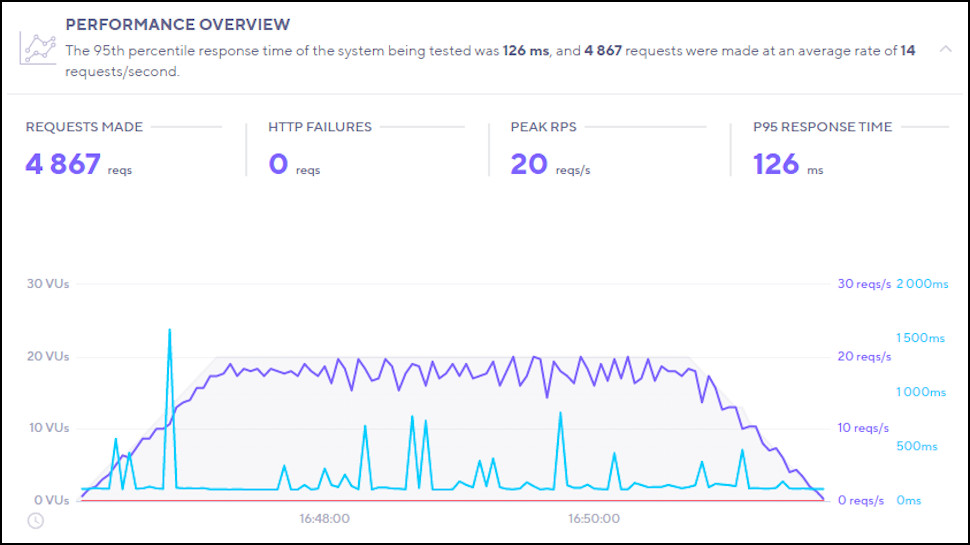
K6 showed us that our test site could handle 14 requests per second which is just about what we'd expect from this level of hosting.
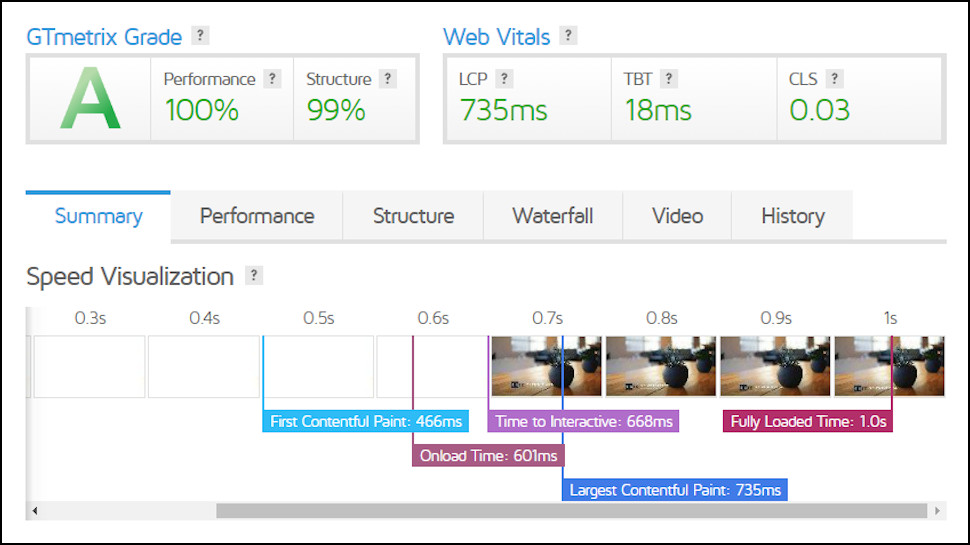
The GTMetrix score showed us the same thing. With an LCP score of 735ms our test site was well below the threshold for concern. A good score is below 1200ms and anything over that suggests that improvements are recommended.
We also had great results from uptime.com. We used uptime.com to access our site every five minutes for 14 days to see how fast our site responded and if there was any downtime. SiteGround gave us a perfect 100% for uptime and was just better than average at 0.207 seconds for response time too.
My thoughts
I don't really like the offering of unlimited websites because putting an unlimited amount of sites on your servers will eventually cause issues but SiteGround say that they are really careful not to overload the servers and the user reviews do not hint that there is any instability in their hosting.
Read our full SiteGround review
Worthy mentions
These hosts didn't make our top three but that doesn't mean you shouldn't give them a consideration.
Best cheap WordPress hosting

Specifications
Reasons to buy
Reasons to avoid
DreamHost have one of the cheapest web hosting plans on the market with its Shared Starter plan. This plan starts at $2.95/mo for one year and renews at $6.99/mo after that. In comparison, most other plans come between $10 and $20 a month.
While the site visits are unlimited, the features and performance is unexpectedly less than what you would get with the more expensive plans. Our testing showed that for simple sites with low (less than 10) concurrent site visits the Shared Starter plan is more than capable of delivering a good users experience.
The unlimited site visits also gives you and your visitors a nice safety net. It's not there to be abused so don't think you can save money by using this plan for larger sites. If your site gets too busy and resource heavy you'll be asked to change your hosting plan.
You don't get email with this plan but if you don't need a yourname@yourbrand.com email address and can use gmail or another email provider that's not a dealbreaker. If you do want a personalised email you can add an email box for $1.67/mo which still makes this plan cheap compared with others.
Best with WordPress hosting with builder

Specifications
Reasons to buy
Reasons to avoid
This one's a bit different from the rest of the options on this list. Elementor is widely known as one of the best website builders and a WordPress plugin. However, it now also offers fantastic WordPress hosting, making it a one-stop shop for all your WordPress needs.
The starter-level ‘Lite’ plan is $2.99/mo (renews at $11.99/mo) and includes Elementor’s free website builder, which is more than capable of creating and maintaining an impressive WordPress website for you thanks to its 25 widgets and responsive designs. At the hosting end of things, this plan can support one website and offers 5 GB of storage, 10 GB of bandwidth, and unlimited visits thanks to auto scaling technology (Currently the limit is advertised as 10K but it's not enforced). You also get a free domain for one year.
All the other plans unlock Elementor’s Pro Builder, which comes with 100+ widgets, no-code forms and fascinating pop-ups to increase engagement and conversion, and e-commerce features such as the ability to build captivating listings and product and post templates.
It’s impressive that none of the hosting plans – not even the most basic one – is bare-bones when it comes to security. You get multi-factor authentication, regular security software updates, SSL certificates, automated daily backups, real-time cloud protection services, and DDoS and WAF safeguards to protect against malware and fraudulent traffic.
Additional features include Cloudflare CDN with 285+ locations, an integrated caching tool that ensures faster page-loading speeds than the competition, full FTP functionality, and a staging environment, as well as free and one-click migration of your site to Elementor.
Elementor uses a cloud infrastructure for hosting WordPress websites, meaning you benefit from automatic scaling (which is what we’ve come to expect with the best cloud hosting providers), when your website usage out grows the resources in peak hours. This ensures your website will always be fast and load quickly.
Elementor's customer support is also up to industry standards, as you get premium support for both its hosting product as well as for Elementor’s dedicated website builder. There’s also live chat, a rich knowledge base, and a community for discussing your queries.
Read our full Elementor review
Best WordPress hosting for multiple sites
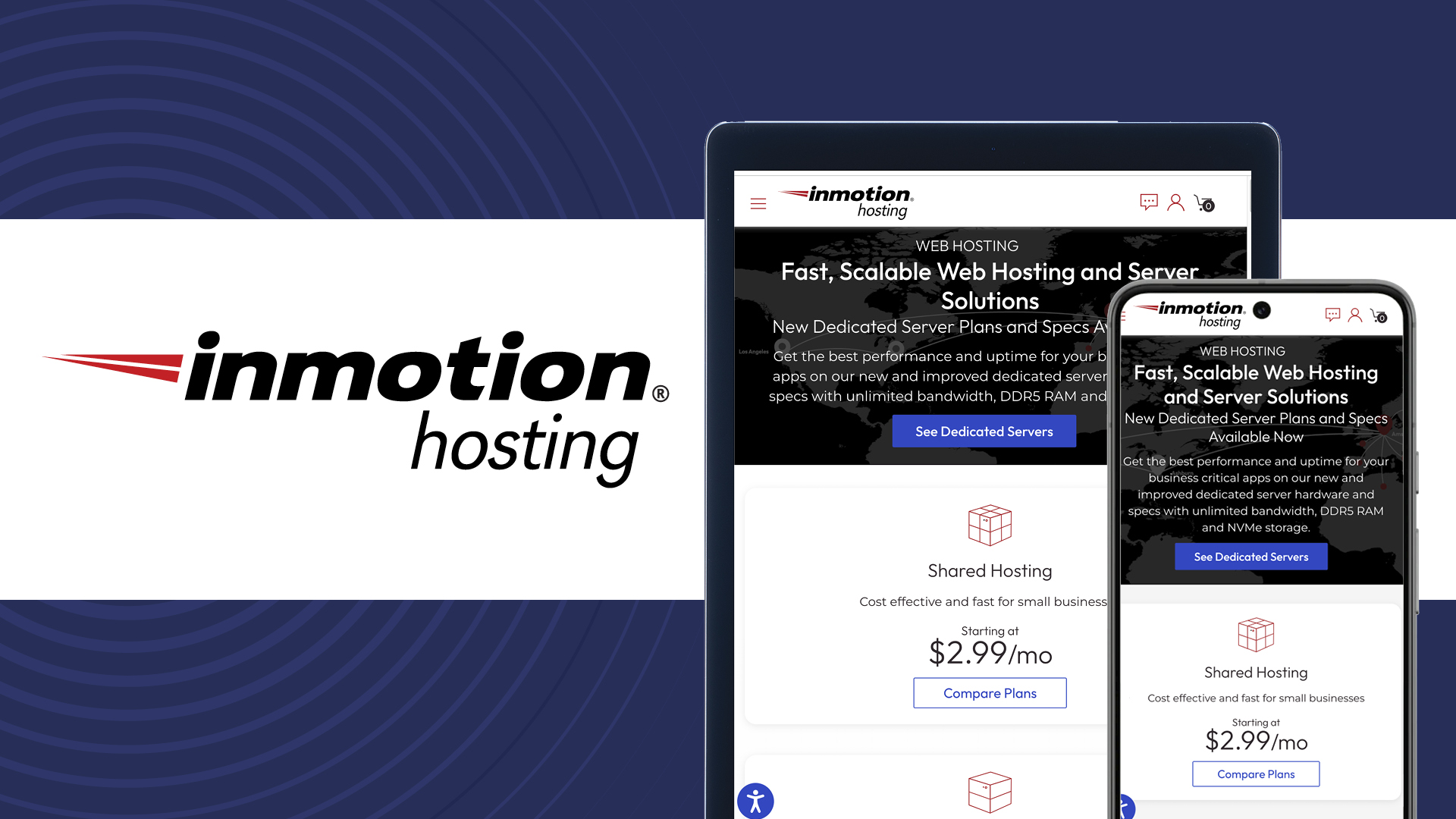
InMotion Hosting
Our expert review:
Specifications
Reasons to buy
Reasons to avoid
Unlike the majority of WP hosts that only offer a single website and basic functionality on their starter plans, InMotion’s baseline ‘WP-Core’ plan allows you to host two websites and gives you 100 GB of fast NVMe SSD storage, 10 email addresses, unlimited bandwidth, pre-installed WordPress, automatic updates, cPanel site management, and extras like BoldGrid and WP-CLI (this allows you to update plugins, configure multisite installations, and loads more, without having to use a web browser).
This plan is priced at $2.79 per month initially (on the 3-year option) and $10.49 on renewal. Upgrading to the next plan will unlock support for 25 websites, unlimited emails, unlimited storage, advanced caching, WordPress multisite, and a WP staging tool. Thereafter, the last two plans allow hosting unlimited websites, and that at affordable rates – the highest-end ‘WP Pro’ plan costs $11.49 a month ($24.49 on renewal).
A real standout here is that no matter which you plan you choose, you’ll get access to InMotion’s full suite of security features, which include free SSL, protection from hacks, malware, and DDoS attacks, and automatic backups.
However, if you have a mission-critical WordPress site or if you’d like more power and management than what shared hosting can offer, opt for an InMotion managed WordPress VPS instead. You can get started at $14/month (or $140/year) with 4 vCPU, 4 GB RAM, and 150 GB NVMe SSD. These plans improve on the above-mentioned plans’ security by offering a dedicated IP address, SSO authentication, and a firewall. Plus, you get W3 total cache for reduced load times and improved website performance.
InMotion is also a solid choice if you’re environmentally conscious. The company has invested heavily in green cooling technology to make servers more efficient, reduce costs, and save the planet. Another highlight is its Launch Assist, wherein InMotion agents will provide you with up to two hours of assistance, and that too, free of charge. This will come in extremely handy in case you run into any issues, including trouble adjusting domain settings, configuring cPanel, migrating WordPress, or managing database files.
These are seriously well resourced plans. You do get a lot of freedom with InMotion Hosting so they're probably not best suited for WordPress beginners but for agencies looking to host multiple sites for clients these are my top recommendation. No CDN but you do have the freedom to use whichever one you want.
Read our full InMotion Hosting review
Best managed WordPress hosting
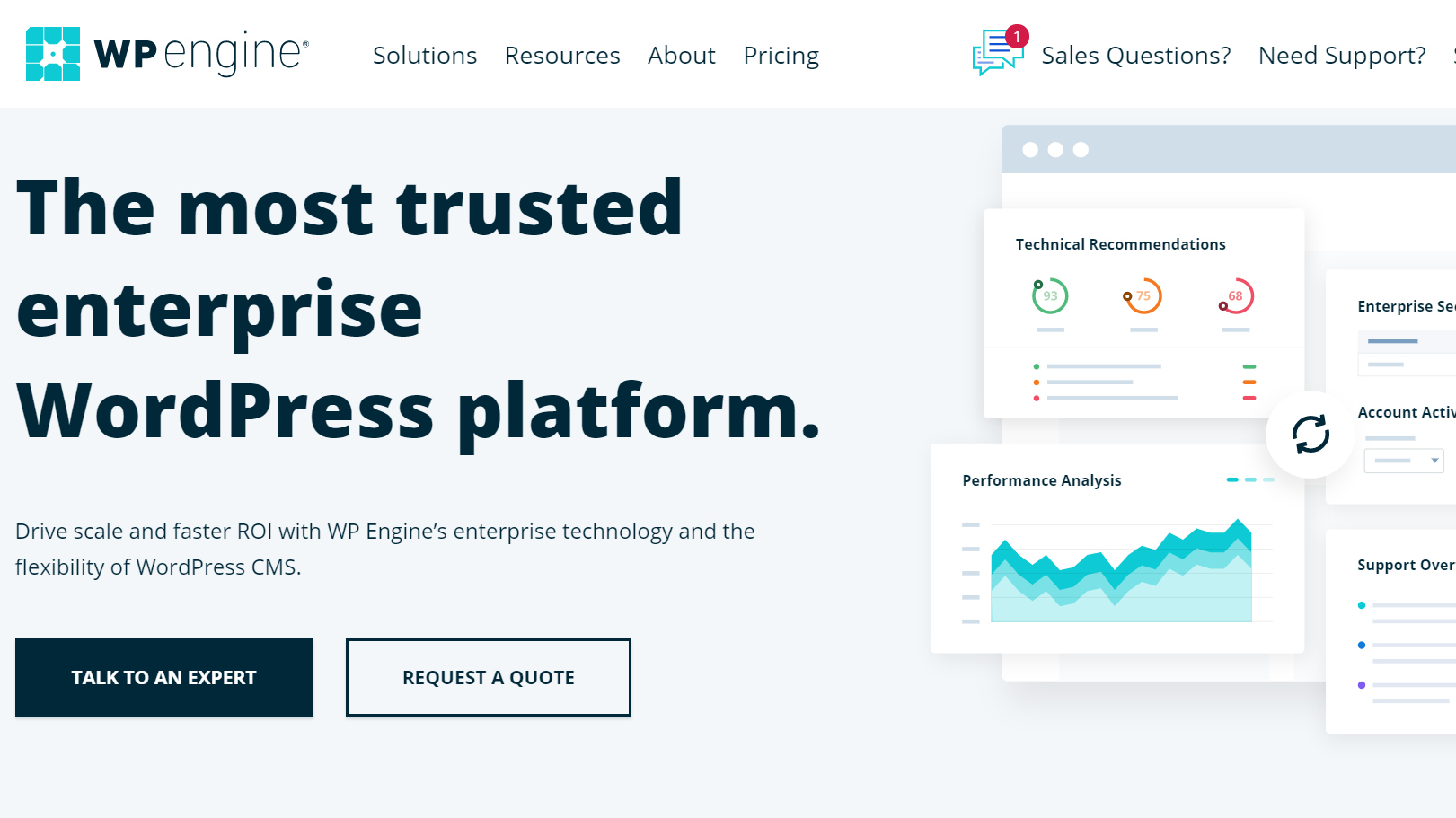
Specifications
Reasons to buy
Reasons to avoid
WP Engine is the best managed WordPress hosting service in the industry. Yes, SiteGround and Hostinger in our list also offer managed WordPress hosting but on a different level. For smaller businesses and those not trying to squeeze the last drop of performance out of their hosting, those options are better but for big business where every single millisecond counts, WP Engine stand out.
WP Engine is built for WordPress and claims that the average speed increase for sites that are migrated to WP Engine get an immediate 40% jump. They also boast a global CDN network with over 200 locations and a proprietary caching system. It manages your WordPress site for you, offering everything you’d expect from a high-quality and true managed WP solution. This includes automatic PHP and WordPress updates, automatic and on-demand backups, free CDN, and great speeds and customer support.
Irrespective of the plan you choose, you get free website transfers, 1-click staging and developer environments, 10 premium themes to customize your site’s looks, and excellent security features such as advanced DDoS and automatic security updates from WordPress experts. Plus, you can also unlock premium onboarding and priority support and the ability to convert your site to a WordPress multisite on the higher-end plans.
A headline WP Engine feature is the customizability of its plans. You can add up to 25 more websites (right from the most basic plan), automated plugin updates, site optimizations, and an extra layer of security. All these cost extra, but it’s good to have the option.
Speaking of costs, WP Engine is not as cheap as the others. It starts at $20 a month with 1 website, 10 GB of storage, and 50 GB of bandwidth. However, a deep level of customization and one of the most comprehensive feature sets, as well as an impressive 99.99% SLA, make it splurge-worthy, especially for SMBs and large-scale businesses looking for a WordPress host that can grow with their websites.
Another fantastic feature is ‘actionable intelligence,’ which you can use to gain insight into the performance of your pages, applications, and content. Despite its long list of features, WP Engine is fairly easy to use thanks to a simple dashboard where everything is easy to find and understand. However, regular use of terms like Git, CNAME and redirect rules might confuse the not-so-technical, but it won’t take long for you to wrap your head around them.
In case you need help, WP Engine also offers class-leading customer support via a 24/7 live chat and an email ticketing system, responses to which are fairly quick and satisfactory. There's also telephone support on all plans except single-site plans, and its web knowledge base is one of the very best there is, with videos and articles on both basic and deeper WordPress functionalities. Even better, WP Engine offers an industry-best 60-day money-back guarantee on most of its plans, meaning you can try it out without risking a penny.
It's so refreshing to just see a price and know that's what you're paying now and will pay on renewal, with standard price increases considered. For most of the other hosts on this page working out how much you will actually be paying on renewal is hard. There has been some recent issues between Mathew Mullenweg and WP Engine but we still believe WP Engine are providing a stable and excellent managed WordPress hosting solution.
Read our full WP Engine review
Best eco friendly WordPress hosting

Specifications
Reasons to buy
Reasons to avoid
GreenGeeks’ WordPress plans are essentially its shared web hosting plans – same prices, same names – just with a bit more extra focus on WordPress in the form of some specific features. These include free migration of your WordPress site from a previous host, on-demand WP backups, and automatic updates of WordPress and its plugins, as well as automatic installation of WordPress.
GreenGeeks also uses the LiteSpeed server and the LS Cache for WordPress plugin to optimize speed. The company claims that this makes your WordPress website up to four times faster. Plans range from $2.95 a month (renews at $11.95 a month) and up to $8.95 a month (renews at $26.95 a month).
All plans (except the first one) support an unlimited number of websites, email accounts, and storage. You get free SSL, free CDN, free domain, built-in caching, cPanel, and unlimited transfers on all plans. That’s great value, which only improves with GreenGeeks' customer support, which includes phone, email, and 24/7 live chat support, as well as an in-depth knowledge base.
In addition to automatic nightly backups, GreenGeeks says that it'll also help keep your website clean and protected against malware. It also comes with a 99.9% uptime guarantee, which is a fairly decent offering, although we've seen better.
However, GreenGeeks stands out for its special and unrivaled focus on saving the environment. As the best green web hosting provider, it's not just a carbon neutral host; it's carbon negative thanks to a 300% green energy match, which is what you get with every single GreenGeeks plan – WordPress, reseller, shared, or VPS. This means that the company puts three times the energy that it consumes back into the grid.
GreenGeeks has been a ‘Green Power Partner' since 2009, recognized by the United States Environmental Protection Agency. It also plants one tree for every hosting account it provisions. However, there are no managed WordPress or dedicated hosting plans with GreenGeeks, possibly because those demand a lot of energy and resources, which doesn’t align with GreenGeeks’ environment-first approach.
One of the best features of GreenGeeks is unlimited storage. While there is some small print hidden away that includes an excessive use policy, if you're operating a normal site storage will not be something you ever need to think about.
The performance metrics are a bit vague with the three levels being standard, better, and best and some things listed as free no one would ever charge for anyway like a WordPress installer so it wasn't immediately clear to me what you're getting for your money but after some digging I'd say it's a little pricey considering that after the renewal price you're paying the same as you would be for managed hosting while this remains unmanaged.
Read our full GreenGeeks review
Best cloud hosting for WordPress
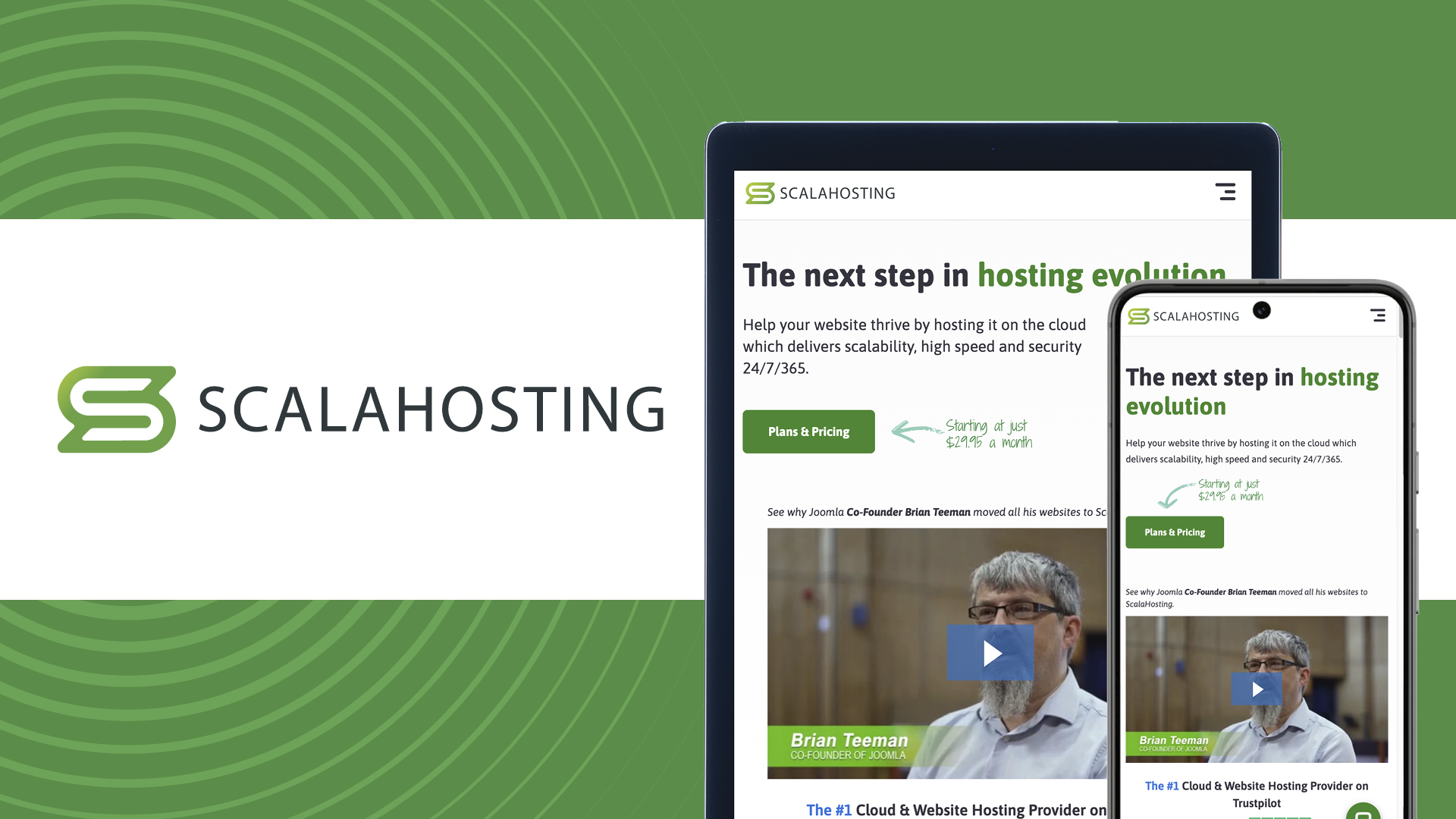
Specifications
Reasons to buy
Reasons to avoid
If you want scalable resources to prevent website slowdowns and crashes, as well as geo-redundancy to keep your website up and running at all times, that’s where ScalaHosting really shines. As the best cloud hosting provider, ScalaHosting offers some of the very best managed cloud VPS plans, all of which include a WP manager that offers installations, auto-updates, free site migrations, WP staging, cloning, WP-CLI, full WordPress management, and expert customer support.
Plus, if you choose ScalaHosting’s native SPanel, you’ll also get great security benefits, including blacklist monitoring and removal, spam protection, and more. SPanel comes integrated with all ScalaHosting VPS plans, whereas cPanel starts at $26.95 for 5 accounts, and the price increases as you add more websites.
Scala’s cloud plans start at a reasonable $29.95/month (on a 1- or 3-year commitment). This one comes with 2 CPU cores, 4 GB RAM, and 50 GB fast NVMe SSD storage. Thanks to the configurability on offer with these VPS plans, you can go as high as 24 CPU cores, 64 GB RAM, and 2,000 GB storage. Plus, all plans come with built-in CloudFlare CDN and protection from brute-force attacks.
ScalaHosting is one of the most affordable WordPress hosting providers for businesses, as it allows you to host an unlimited number of websites on all its WordPress plans (except on the most basic one). It’s worth noting, though, that these ScalaHosting plans offer shared hosting schemes, which is why they’re so cheap.
The cheapest ‘WP Mini’ plan costs $2.95 a month and offers support for one website, a free SSL certificate, and unlimited email accounts (good value). For features such as free domain, real-time malware protection, a dedicated IP address, and OpenLiteSpeed caching, you’ll have to upgrade to one of the higher-end plans. All these plans also come with a one-click WP installer, automated daily and on-demand backups, free CDN, and virus and spam protection.
Also, all ScalaHosting team members are specifically trained for WordPress to help you with any WP-related issue that you might encounter. Plus, there’s little to no wait time, as you can connect to the tech team over chat as well.
Rounding off an excellent overall package is ScalaHosting’s anytime unconditional money-back guarantee (30 days), which promises prorated refunds should you choose to cancel midway through your plan. This means that if you pay for two years and cancel after a year, you’ll be refunded 50% of your original payment.
I'm usually very sceptical whenever I see anything marketed as unlimited; however, from ScalaHosting I believe it as cloud infrastructure genuinely has the ability to scale to meet demands.
After the renewal price, at $19.95 for 100 GB NVMe storage, unlimited basically everything, and daily offsite backups what you get is great value for money. You are missing a CDN but even with that added on you're not going to be paying more than other providers for the same level plan. If you want cPanel you will be pushing into the higher priced plans though
Read our full ScalaHosting review
Namecheap is true to its name and sits among the best WordPress hosting services for those on a tight budget. You can get started for as little as $2.91 a month (billed yearly), where you get support for one WP site, 50K monthly visits, 10GB SSD storage, free CDN, free SSL, free migration, and loads more.
Upgrade to the mid-level EasyWP Turbo plan at $4.91 a month to unlock more storage and visitors, as well as the Brizy Site Builder that'll help you create beautiful no-code websites in a matter of minutes.
If you're willing and able to manage the website yourself, you can opt for a Namecheap shared hosting plan, which will fetch you a free domain and cost just $1.98 per month for the first year. However, it's worth noting that Namecheap claims that their EasyWP managed WordPress hosting is 3x faster than shared hosting.
Another reason Namecheap really stands out as an affordable provider for WP hosting is its renewal costs, which are some of the lowest price bumps we've ever seen. The starter-level plan, for example, costs $2.91 a month (billed yearly) for the first year and renews at just $4.07 a month.
There's also a third plan that improves the uptime guarantee to 99.99% (as compared to 99.9% in the first two plans). All these are managed plans, meaning tasks such as monitoring your site and configuring your server to suit the web traffic are handled automatically. Namechaeap also offers 24/7 support, which is always a good sign.
However, it’s well worth noting that Namecheap offers its managed WordPress hosting plans in partnership with EasyWP, which is a different hosting service altogether. This shouldn’t be a cause for concern, though, as EasyWP is both excellent and reliable.
There are some omissions, like no email, no staging, and no cPanel. However, Namecheap does offer the EasyWP dashboard that's simple yet powerful enough to manage all of your WordPress websites. This is good news for beginners, but experts might still want the industry-standard cPanel. Additionally, even the highest-end Namecheap plan supports just one WP site. If you want to host more websites without breaking the bank, we'd recommend you check out Bluehost.
Namecheap are better known for their domain name service and already have a great reputation in the web hosting world. You don't get much as standard with these plans but they are cheap and you can always get what you need from Namecheap if you want anything at a later date as Namecheap's product catalogue is pretty broad.
Read our full Namecheap review

Elementor are relatively new to hosting but already they are matching the speeds of WP Engine. If you only want one site the value for money is good for the speed and the plans are managed so you get backups and updates done for you.
Personally, I'm not a fan of builders that work on top of WordPress. I think there is nothing wrong with WordPress's builder (Gutenberg) and using another builder means you inevitably will be learning to use two things at some point. Still, I am a minority and most people prefer Elementor to Gutenberg.
On balance probably the better choice if you have one site and will be using Elementor anyway. ★★★★
Best WordPress hosting: FAQs
What is WordPress hosting?
WordPress is an open source CMS and website builder that is used by over 40% of websites on the internet today.
With some technical knowhow anyone can download WordPress and then upload and install it on a server. For those that don't have this knowledge, web hosting providers will often provide a server that is preconfigured for WordPress with WordPress already installed or ready to be installed with one click.
WordPress hosting from a web hosting provider will often give you better results than doing it yourself unless you are an expert and will also provide easier management and security if you go for a managed option.
What is better for me? WordPress hosting or shared hosting?
The really short answer is that WordPress hosting and Shared hosting is identical as most plans are already optimized for WordPress. That being said, there are some more details that might make you want to go with one or the other. For more info, you can check out WordPress vs Shared hosting: which should I use?
How do hosts get recommended on WordPress.org?
WordPress says, "Listing is completely arbitrary, but includes criteria."
Essentially these hosts are selected by Mathew Mullenweg and are his opinions based on how well a host supports the WordPress community. What Matt recommends as the best hosting for WordPress is not necessarily the best hosting. Recent issues between WP Engine and Matt reflect this.
Another example is that I do agree that Bluehost are one of the best hosts for WordPress but not necessarily from a hosting perspective. Bluehost have done a lot for the community and are really good for beginners. Their site building tools are great but they're not the fastest, cheapest, or best bang for buck when it comes to hosting and they user ratings are not as good as other hosting providers.
What are the benefits of WordPress hosting?
One of the best things about WordPress is the amount of plugins and themes that make creating a professional website seamless. Not all these plugins are actually good for your site though. Inviting plugins and themes into your website has security risks and can negatively impact the speed of your site. This is why the best WordPress hosting providers spend a lot of time vetting plugins and limiting what you can and cannot do with your site and providing their own tools and templates. Plus, their specific server configuration and settings will improve your site speed overall.
There are of course other factors too. Such as customer support for the WordPress website builder itself, a world-wide CDN, and backup and security features. The right WordPress hosting provider for you is the provider that gives you the best WordPress features and gives you a user experience that feels more like a safety line than a straightjacket.
What is a WordPress configuration?
The configuration is the combination of software and settings that sit between WordPress and the physical hardware. There are loads of ways to configure a server for WordPress and hosts reconfigure their WordPress set up every couple of years as software is updated to get the best speed and efficiency.
You can set this up yourself or choose a WordPress hosting plan from a hosting provider. A lot of provider's standard shared plans are optimized for WordPress because the majority of websites uses WordPress anyway. So, if you see that the shared plans and WordPress plans look almost identical, that's why.
How to choose the best WordPress hosting provider?
If you don't have the time or technical experience to handle all the technical ins-and-outs of running your WordPress operation, you might prefer to buy a managed WordPress hosting plan, and have the hosting company handle things for you.
The host will often import your previous WordPress blog, if you have one. Usually you'll get preinstalled themes and plugins to simplify customization. But you can also download some of the best WordPress themes and the best WordPress plugins for additional personalization. Some hosts will let you download more than others.
There should at least be an option to automatically update the site, a security service like SiteLock will be on hand to keep your blog malware-free, and we would expect 24/7 support from a team with real WordPress knowledge.
The best hosts go even further, optimizing their servers to boost WordPress performance, and sometimes throwing in extras like a content delivery network (CDN) to deliver great speeds worldwide (or that's the idea, anyway).
How we test each WordPress hosting provider
Our team of reviewers have tested a wide range of hosting options, including the best managed WordPress hosting and the best WordPress website builders.
When assessing which WordPress hosting service is best, we get the full experience of each one by signing up, creating an account and checking what each provider does to help new users. On the checklist, we go through ease of use, features, and what each WordPress hosting service offers for its price plans.
We weigh up the details of what you get, and what you don't get, and rank each WordPress hosting provider based on the quality of its features and the way it performs.
Our reviewers conduct tests on speed, uptime and reliability on each WordPress hosting provider listed above that created the foundation to which this list was built on.
With WordPress hosting, as it's a form of web hosting optimized to run WordPress websites, we test the tools and services that are specifically tailored to WordPress websites to pick out the best of the best.
Features such as free website migration, SSL and free domain, and of course, 24/7 customer support, are some of the main offerings that our reviewers look for to compile the list of the best WordPress hosting provider.
For the sake of transparency, our reviewers also searched for the positives and negatives of each WordPress hosting provider so that you have a clear understanding of what to expect.
Our reviews are not just based on these tests though. We go out into the community and speak with WordPress developers, the hosts themselves and the users of sites to really get a feel and deep understanding of the company culture, user base, and website performance.
Tests are one thing but longevity is equally important so we wouldn't recommend a host based only on a few weeks or months of testing. We spend time talking with the people that have been using them for years, why they chose this particular host, what they think they're good at, and what they could do better.
TechRadar Pro has become an authority on web hosting and hosting providers update their services based on our feedback that is trusted in the community. This is all thanks to our expert team and years of experience.
Are you a pro? Subscribe to our newsletter
Sign up to the TechRadar Pro newsletter to get all the top news, opinion, features and guidance your business needs to succeed!

James is a tech journalist covering interconnectivity and digital infrastructure as the web hosting editor at TechRadar Pro. James stays up to date with the latest web and internet trends by attending data center summits, WordPress conferences, and mingling with software and web developers. At TechRadar Pro, James is responsible for ensuring web hosting pages are as relevant and as helpful to readers as possible and is also looking for the best deals and coupon codes for web hosting.


